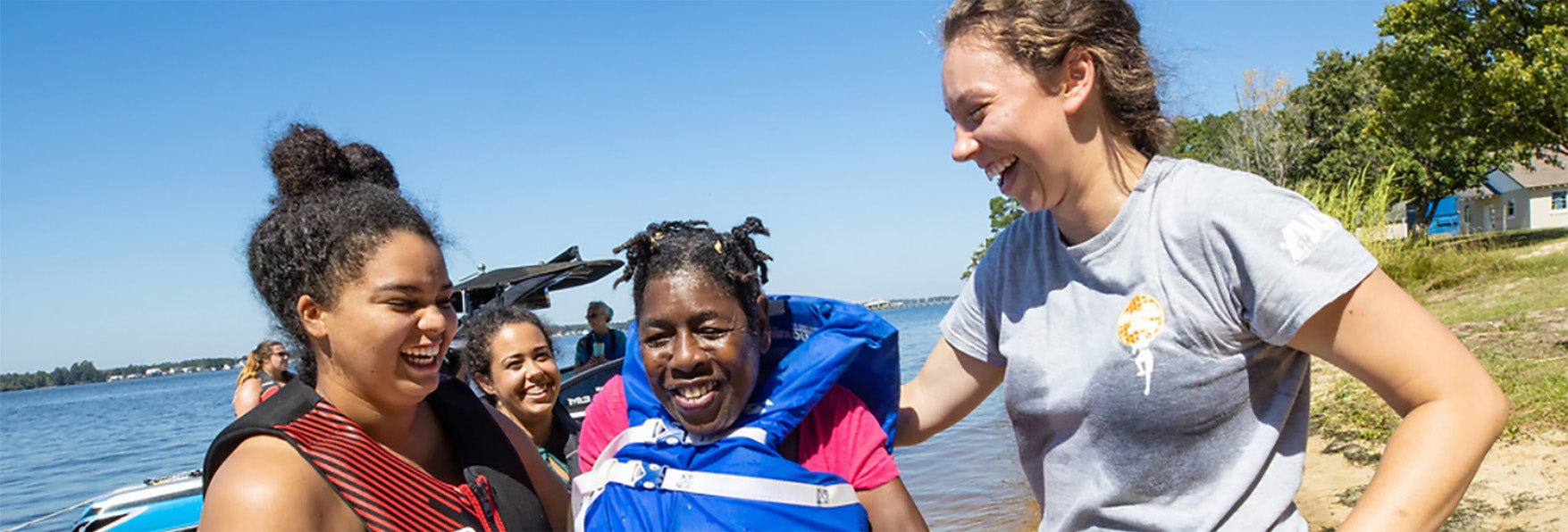BS in Recreational Therapy
Do you have an interest in working with people who have a disability, are recovering from a serious illness or accident, or are struggling with mental health issues? Do you have a calling that is urging you to reach out to those who are dealing with physical, social, emotional, or cognitive challenges to help them reach a better quality of life?
Students studying recreational therapy learn the skills needed to work with people in allied health-care settings such as hospitals, psychiatric clinics, long-term care facilities, rehabilitation clinics, substance abuse centers, and similar settings. You might work with returning injured service-members, seniors, children, adolescents, and individuals from all walks of life. The BS degree in recreational therapy at ECU has a strong clinical focus, which means that graduates will work side-by-side with physicians, occupational and physical therapists, nurses, and other members of an individual's treatment team wherever they work. The goal is always to help the patient/client achieve the highest level of functioning possible so as to experience life to the fullest. ECU recreational therapy students learn in the classroom, through practicum experiences, and they spend 15 weeks in a full-time internship where they learn to work with a variety of clientele in various settings. Upon graduation, students are eligible to sit for the national certification exam and become credentialed to work in the field. In North Carolina, both national certification and state licensure are required to practice recreational therapy.
ECU Recreational Therapy 100% National Certification Pass Rate for 2019-2020
Admission Requirements
Any student wishing to declare a major in recreational therapy (RT) must, at the time of entrance into the RT Program, possess a minimum 2.5 GPA; have completed ENGL 1100, ENGL 2201; MATH 1065, MATH 2228, or higher general education math course; BIOL 2130, BIOL 2131 or BIOL 2140, and BIOL 2141; have submitted an application; complete a 10 question interview through interview stream; submit a signed RT Technical Standards form; and have completed a sequencing form (timetable) in consultation with a RCTX advisor in the HHP Advising Center.
Program Requirements
BS/MS Recreation Science Accelerated Program Information
Prior to registering for 4000 level RCTX courses, all RT students are required to complete the recreational therapy fieldwork experience. This requires a minimum of 25 documented hours of directed experience in recreational therapy programs and recreation-based activities for individuals with disabilities.
Click here for RT Field Work Experience Documentation
Admission to recreational therapy is competitive and limited due to space availability. Majors must maintain a minimum cumulative 2.5 GPA and a minimum cumulative 2.5 GPA in all cognate courses to remain in good standing. Majors must earn a minimum grade of C (2.0) in all required RCSC and RCTX courses.
Delivery Methods
This program is only offered in an on-campus, Face to Face format.
Accreditation Information
The recreational therapy (RT) program is accredited by the Commission on Accreditation of Allied Health Education Programs (www.caahep.org) upon the recommendation of the Committee on Accreditation for Recreational Therapy Education (CARTE). The goal of the program is “to prepare competent entry-level Recreational Therapists in the cognitive (knowledge), psychomotor (skills), and affective (behavior) learning domains.”
ECU RT Clinical Performance Outcomes
Institutional and Professional Licensure Disclosures for Enrolled and Prospective Students
ECU degree programs satisfy the professional licensure and/or certification requirements in North Carolina and prepare students to sit for these exams. However, requirements in other states may be different.
If you are considering a degree program that may, would, could or potentially lead to a professional license and/or certification, please note that at this time ECU may or may not be able to advise whether a program meets requirements outside of North Carolina. Prior to enrolling in a degree program, please discuss this important topic with your program of interest.
